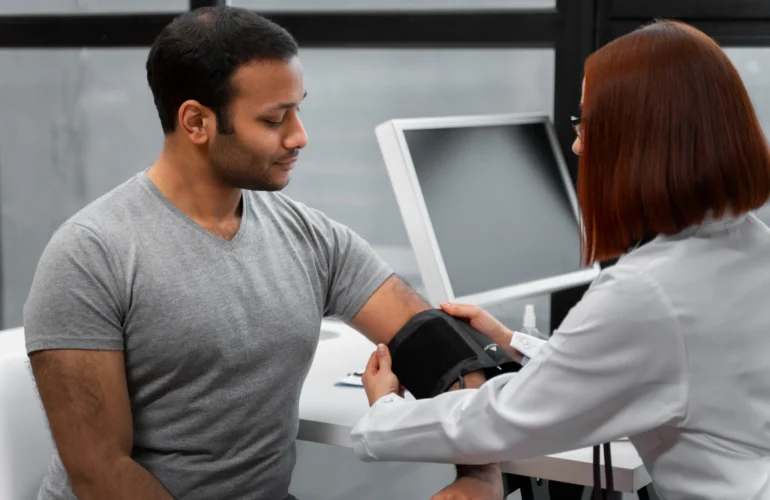THE IMPORTANCE OF REGULAR HEALTH CHECKUPS
In today’s busy world, health often takes a backseat. Many visit a doctor only when symptoms appear, neglecting preventive care. However, regular health checkups are vital for early detection, prevention, and effective management of diseases. They help identify potential health risks before they become serious, ensuring timely intervention. Prioritizing routine screenings can lead to a longer, healthier life by reducing complications and medical costs. Investing in preventive healthcare today safeguards overall well-being for the future.
WHY REGULAR HEALTH CHECKUPS ARE IMPORTANT
Early Detection of Diseases
Many serious illnesses, such as cancer, diabetes, and heart disease, develop silently over time without noticeable symptoms. Routine health checkups help detect these conditions early, allowing for timely treatment and better outcomes. Early diagnosis can significantly improve survival rates and reduce complications.
Prevention Is Better Than Cure
Regular screenings and tests can identify risk factors before they develop into serious health problems. For instance, high blood pressure and high cholesterol levels are often precursors to heart disease. With timely medical intervention, lifestyle changes, and proper medication, such risks can be mitigated.
Monitoring Existing Health Conditions
People with chronic illnesses such as diabetes, hypertension, and asthma require regular monitoring to manage their conditions effectively. Routine checkups ensure that prescribed treatments are working as intended and allow doctors to make necessary adjustments to medications or lifestyle recommendations.
Boosts Longevity and Quality of Life
Regular medical checkups encourage healthier lifestyle choices. When people are aware of their health status, they are more likely to take proactive steps toward well-being, such as exercising, eating healthier, and reducing stress. Over time, these small efforts contribute to a longer and healthier life.
Reduces Healthcare Costs in the Long Run
Treating illnesses in their advanced stages can be financially draining due to expensive medications, hospitalizations, and surgeries. Regular health checkups help detect problems early, leading to cost-effective treatment plans and reducing the financial burden on individuals and families.
WHAT DOES A ROUTINE HEALTH CHECKUP INCLUDE?
A general health checkup typically includes:
- Physical Examination: Checking vital signs like blood pressure, heart rate, and temperature.
- Blood Tests: Assessing cholesterol levels, blood sugar, and detecting infections.
- Urine Tests: Identifying kidney or urinary tract infections and other underlying issues.
- Imaging Tests: X-rays, ultrasounds, and MRIs to detect abnormalities in the body.
- Cardiac Health Assessment: ECG or stress tests for individuals at risk of heart disease.
- Cancer Screenings: Mammograms, pap smears, colonoscopies, and prostate exams, depending on age and gender.
- Dental and Eye Checkups: Oral health and vision issues can be indicators of broader health problems.
HOW OFTEN SHOULD YOU GET A HEALTH CHECKUP?
The frequency of health checkups depends on factors such as age, gender, medical history, and lifestyle. However, general guidelines suggest:
- 20s to 30s: Health checkups every two to three years if no underlying conditions exist.
- 40s: Checkups every one to two years, focusing on cholesterol, blood pressure, and diabetes risk.
- 50s and above: Annual checkups are essential, including screenings for osteoporosis, heart disease, and cancer.
- People with existing health conditions: More frequent checkups as per the doctor’s recommendation.
- Importance: Regular checkups help detect health issues early, ensure timely treatment, and promote long-term well-being.
OVERCOMING COMMON EXCUSES FOR SKIPPING CHECKUPS
Many people neglect regular checkups due to various reasons:
- “I feel fine, so I don’t need a checkup.”
Not all diseases show immediate symptoms. Preventive tests help uncover hidden health risks. - “It’s too expensive.”
Many health insurance plans cover preventive checkups, and early detection saves money in the long run by avoiding costly treatments. - “I don’t have time.”
Health is an investment, not an expense. Setting aside a few hours for a checkup can prevent years of potential suffering. - “I’m afraid of what I might find out.”
Fear is understandable, but knowledge is power. Catching a condition early often means better chances of treatment and recovery.
THE ROLE OF HOME HEALTHCARE SERVICES
For many individuals, especially the elderly and those with mobility issues, visiting hospitals for routine checkups can be difficult. Long wait times, transportation challenges, and the discomfort of hospital visits often discourage people from seeking timely medical care. This is where home healthcare services, like Kaigo Home Health Care, play a vital role. Kaigo offers professional, compassionate, and convenient healthcare services right at your doorstep. With skilled medical professionals providing routine checkups, treatments, and wellness monitoring at home, patients can receive quality care without unnecessary stress. This not only ensures accessibility but also enhances comfort and overall well-being.
FINAL THOUGHTS
Regular health checkups require minimal effort but offer immense benefits. They help detect potential health risks early, improve disease management, and encourage a proactive approach to well-being. Preventive healthcare should be a priority, not an afterthought. Investing in routine checkups today can lead to a healthier and more fulfilling life tomorrow. If you haven’t scheduled your next health checkup yet, take the step today—it’s one of the best decisions for your long-term health.

